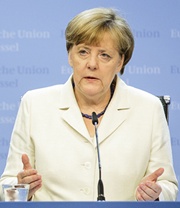German parliament votes ‘yes’ to Greek bailout talks
18 Jul 2015
 The German parliament has overwhelmingly approved opening of negotiations to work out a financial rescue package for Greece, the debt-laden euro zone nation struggling with one of the worst economic crises in modern history.
The German parliament has overwhelmingly approved opening of negotiations to work out a financial rescue package for Greece, the debt-laden euro zone nation struggling with one of the worst economic crises in modern history.
German lawmakers voted 439-119 in favour of the European Union's (EU's) third bailout deal agreed earlier this week with Greek officials led by the country's radical left Prime Minister Alexis Tsipras.
Chancellor Angela Merkel said in the parliament, "The principle of responsibility and solidarity that has guided us since the beginning of the European debt crisis marks the entire result from Monday.''
The alternative to an agreement, she warned, "would not be a time-out from the euro that would be orderly but predictable chaos."
Earlier in the day, the European Council has confirmed a €7.2-billion ($7.7 billion) bridge financing to Greece from the EU emergency fund European Financial Stability Facility (EFSF), to avoid an imminent default to two of its creditors, the European Central Bank (ECB) and the International Monetary Fund (IMF).
Greece has already defaulted on a €1.55-billion ($1.7 billion) payment to the IMF at the end of June and the ECB payment due on 20 July is €4.2 billion.
The negotiation process for the proposed €86-billion, three-year bailout is expected to take about a month. The financial package is designed to help the beleaguered nation to get out of the crisis and limp back to economic normality.
Earlier this week, the Greek parliament approved the sweeping austerity measures stipulated by the EU to pave way for the bailout talks, but at a huge cost to Tsipras and his left-wing Syriza party. (See: Greece gains, Tsipras loses as parliament approves EU bailout package).
Of the 300 parliament members, 223 voted in favour of the deal including members of three opposition parties, while a little more than a quarter of the 149 from Syriza party either voted against or abstained.
Tsipras said the deal went against his election promises but he had no other choice as the alternative would have seen the country out of the euro bloc, which could have been more detrimental.
In a cabinet reshuffle yesterday, Tsipras replaced hardliners who had voted against harsh austerity measures which include pension cuts and tax increases.
Greek parliamentary approval was a crucial step towards rebuilding trust between Greece and its international partners, EU vice-president Dombrovskis said in a statement yesterday.
''What we're witnessing is European solidarity in action. Politicians across 27 countries have invested their own political capital to speed through national decisions to shoulder Greece at this difficult time for the country,'' Dombrovskis said.
This week's decisions are the first building blocks for restoring trust. "However, there is still a very long way ahead of us," Dombrovskis said.
The second reform package, including the adoption of the code of civil procedure and the transposition of the bank recovery and resolution directive, is scheduled for vote on 22 July.
''What will count in a longer perspective is the practical implementation of reforms,'' Dombrovskis said.
Greek banks have been shut down since the last week of June and ATM withdrawals have been restricted to a paltry €60 a day.
This week, ECB raised its emergency liquidity assistance to Greek banks, paving the way for the country's banks to reopen after a three-week gap.


















